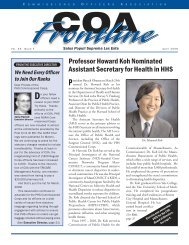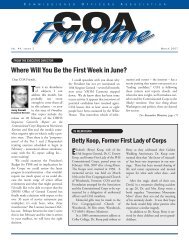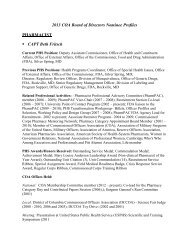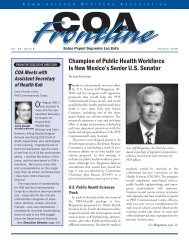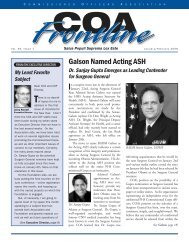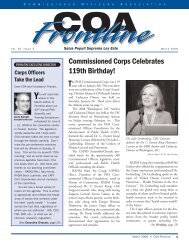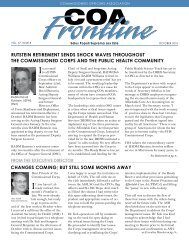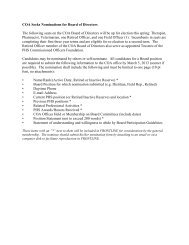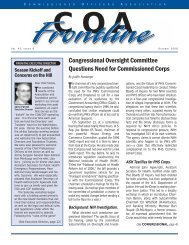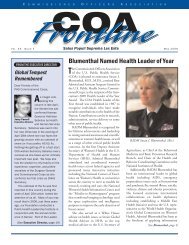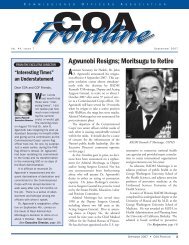February 2005 Frontline - Commissioned Officers Association
February 2005 Frontline - Commissioned Officers Association
February 2005 Frontline - Commissioned Officers Association
You also want an ePaper? Increase the reach of your titles
YUMPU automatically turns print PDFs into web optimized ePapers that Google loves.
<strong>Commissioned</strong> Corps Physical Therapist<br />
Eases Pain from Florida Hurricanes<br />
Article submitted by LCDR Michael<br />
LaPlante PT, DSc,ECS, Chief Physical<br />
Therapist, Winslow Indian Health Care<br />
Center (WIHCC).<br />
Like any dutiful <strong>Commissioned</strong> Officer,<br />
I replied to the web site on<br />
September 3, 2004 to register for<br />
possible deployment due to Hurricane<br />
Frances. I have been 'deployable' for<br />
many months, so I didn't think this<br />
would be any different from all the<br />
previous times I had responded. But to<br />
my surprise, my clinical director, Dr.<br />
Armao was contacted that day to acquire<br />
permission for my deployment! He and I<br />
both jumped through all the permission<br />
hoops and I was set to go. We were both<br />
surprised by the quick reply of the Corps,<br />
but still thought it was only an exercise.<br />
My weekend was quiet until Sunday<br />
when I was called at 3:15 and told to<br />
board my plane at 4:20. With only<br />
minutes to spare, I quickly packed,<br />
jumped in my car, and sped (but of<br />
course below the speed limit...) to the<br />
airport for my flight. The gracious gal at<br />
the counter was understanding of my<br />
situation, and allowed me to check in<br />
even though I was 15 minutes late. I<br />
boarded my plane and made it to Atlanta,<br />
arriving at 2 am in the cold and rainy<br />
town and, unfortunately, finding out that<br />
I had no place to stay. Following some<br />
difficult maneuvering, I was able to<br />
locate a place downtown, and got in a<br />
solid four hours jet-lagged sleep before<br />
having to rise and get back to the<br />
training center.<br />
After checking in with the Federal<br />
Emergency Management Agency<br />
(FEMA), I stayed in Atlanta for two days,<br />
and was trained as a 'community representative'<br />
to work in post-hurricane<br />
areas assessing damage and informing<br />
residents about the types of disaster<br />
relief available through FEMA.<br />
Following training, I was deployed to the<br />
Orlando Area with 31 other Corps officers,<br />
and some civilians, to canvass that<br />
region and get the FEMA word out. This<br />
particular job during deployment was<br />
quite interesting, as I was able to personally<br />
meet with many people who had<br />
their lives completely turned upside<br />
down by these hurricanes. Providing<br />
some comfort and hope that they were<br />
not alone after such a traumatic (both<br />
materialistic and emotional) disaster was<br />
intrinsically rewarding. With FEMA, we<br />
were able to instill a sense of order to<br />
peoples’ lives and give them hope that<br />
tomorrow might really be a better day.<br />
A few days later, my team was<br />
deployed to Citrus County. Along the<br />
coast, we found significant flooding and<br />
damage to trees and most billboards.<br />
Roads were under water and power and<br />
potable water were rare, but I could see a<br />
resiliency in the local citizens that made<br />
me feel good about the people of America<br />
and our ability to bounce back from<br />
many types of life's challenges. My team<br />
member (Phil Toy) and I had just gotten<br />
into the swing of things with FEMA,<br />
when our detail changed, and we were<br />
re-assigned to work at a 'Supershelter' in<br />
Orlando. This shelter was established<br />
because Hurricane Ivan, even larger than<br />
the other hurricanes, was heading our<br />
way. The shelter had the capacity to<br />
house up to 8,000 people, some just<br />
needing a bed, others having significant<br />
medical needs.<br />
On my first day reporting for duty<br />
there, we had an 'all hands' meeting to<br />
outline what our goals would be in<br />
setting up the shelter. I have been in the<br />
Corps for about ten years and, until that<br />
day, had never seen so many officers in<br />
one place at one time. DMATs had gotten<br />
the shelter off the ground, but we were<br />
transitioning in to take over, in partnership<br />
with the Forest Service. One might<br />
wonder why the Forest Service had<br />
anything to do with the hurricane relief,<br />
but since they work large disasters<br />
frequently (forest fires), they are familiar<br />
with how to get large-scale responses<br />
organized.<br />
I was the only physical therapist at the<br />
shelter, so I was appointed team leader<br />
for family activities and recreation.<br />
Imagine a multi-thousand square foot<br />
room, full of beds and cots, and nothing<br />
to do. With little in the way of resources,<br />
our team, which consisted of seven officers,<br />
developed an entire Activities of<br />
Daily Living (ADL) program and an<br />
activity program from scratch. Jodi<br />
Tanzillo, from Shiprock, became our<br />
chair aerobics teacher, Gillian Engleson<br />
(See THERAPISTS, page 23)<br />
CAPT’s Kendra Wallace (left) and Fran Oakley (right) break down shelter beds at<br />
the “Supershelter” in Orlanda, Florida.<br />
COA FRONTLINE • FEBRUARY <strong>2005</strong> 21



